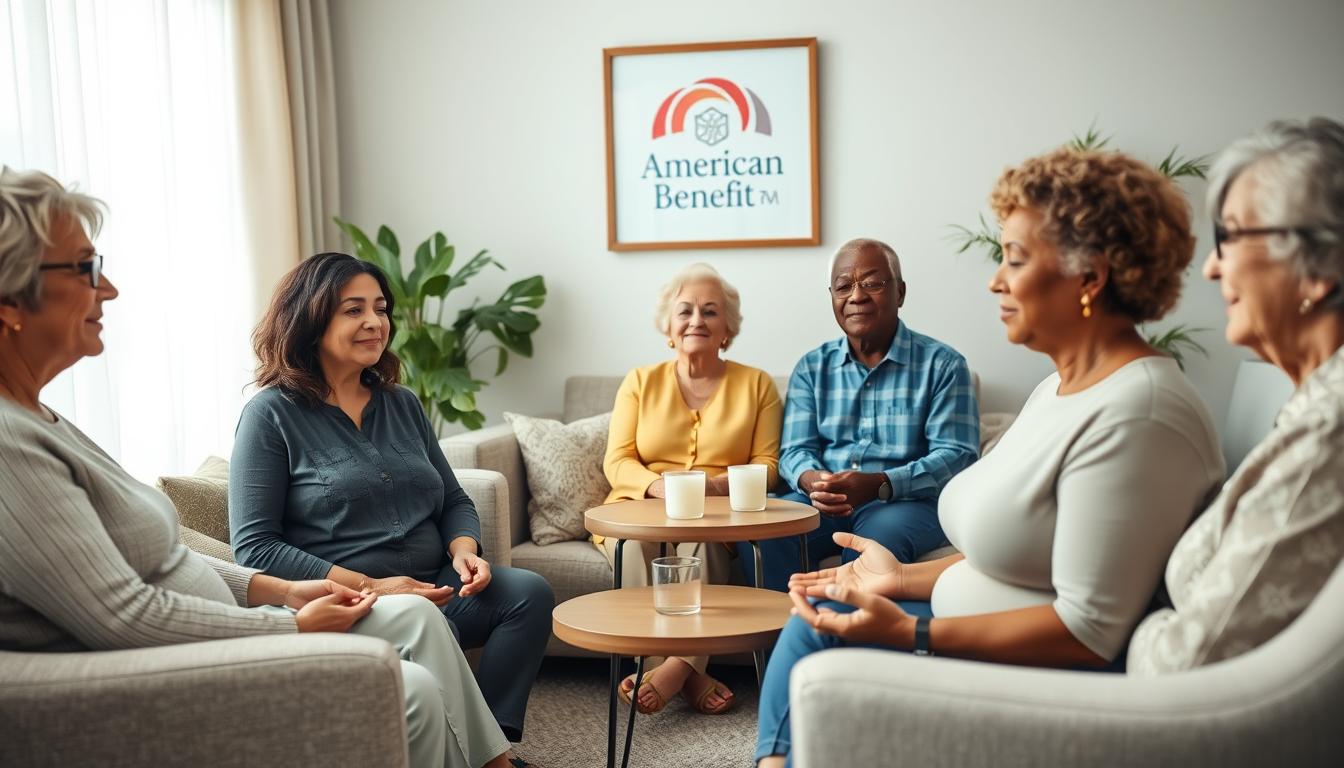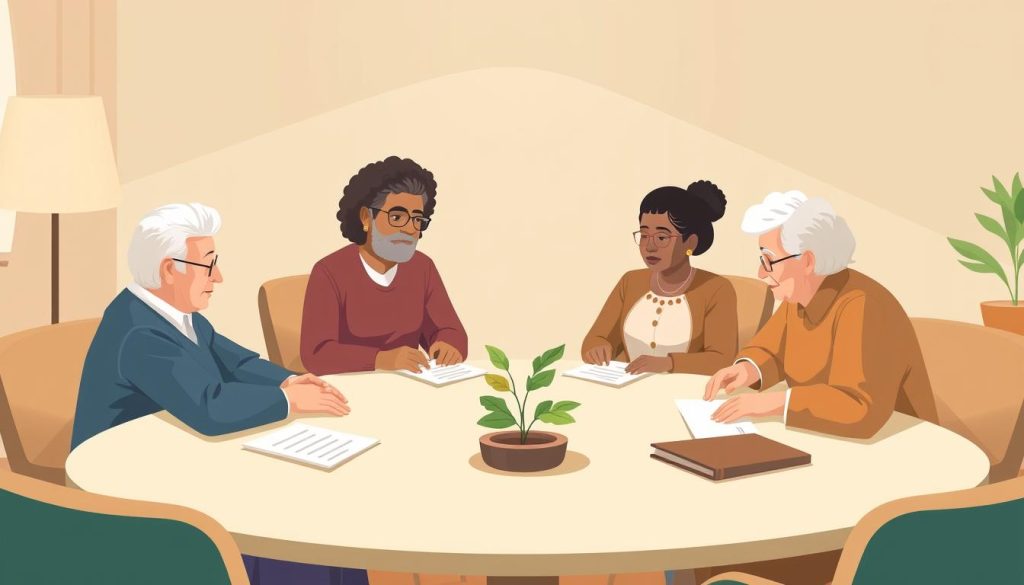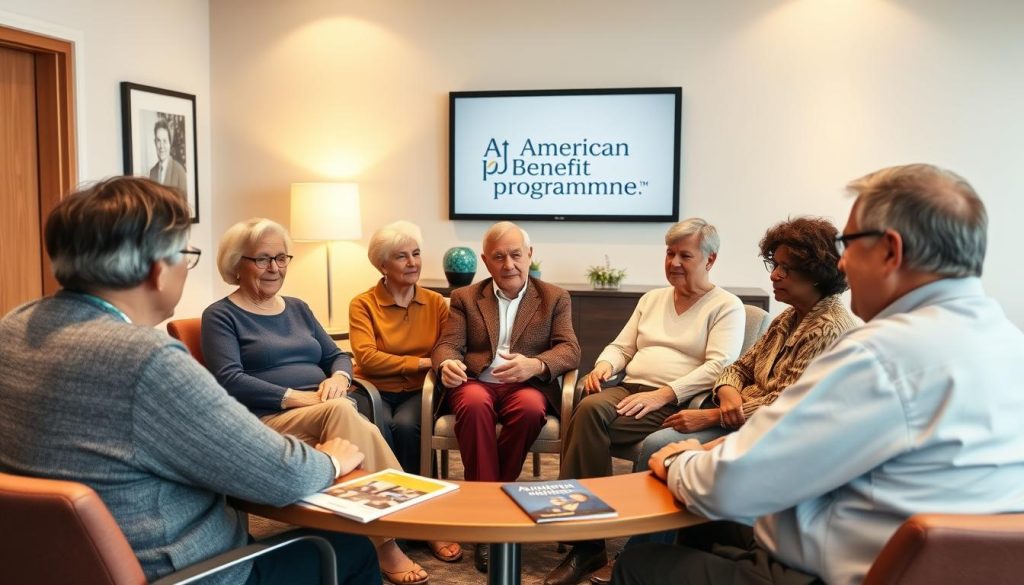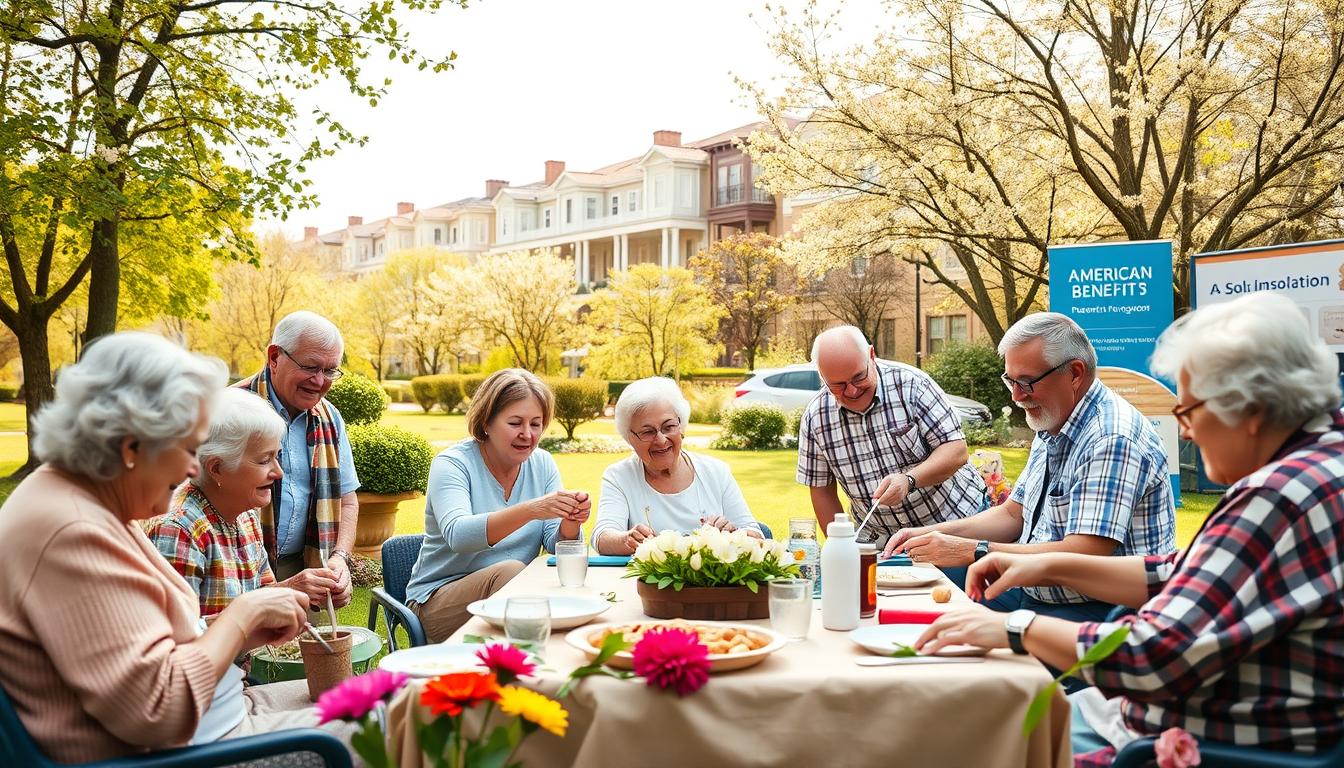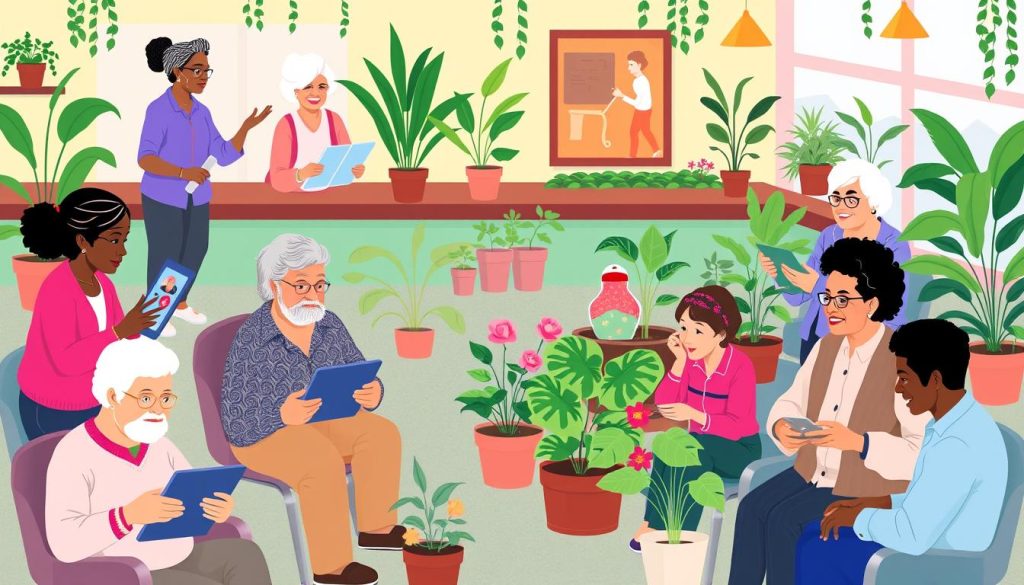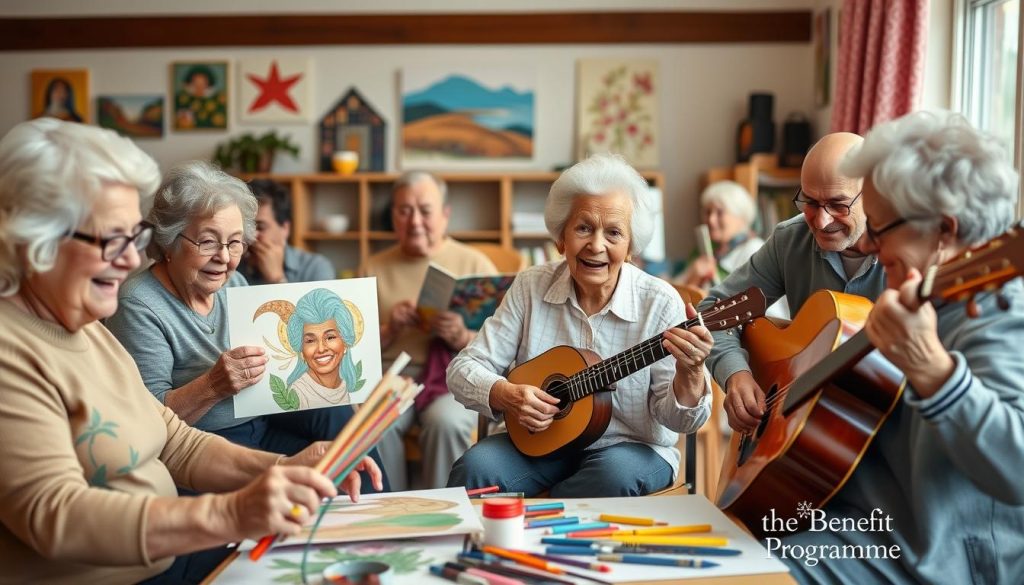Ever thought about embracing your golden years with joy and safety? Many seniors now want to stay independent and stay connected. Senior life planning covers money, health, friends, and living places. It helps tackle worries like money troubles, worsening health, and the fear of being a burden.
About 80% of seniors have at least one long-term illness. So, good health care is key to a happy life1. Nearly 40% might not drink enough water1. That shows we need to take care of our health early. Senior life planning involves planning for retirement and finding care for elders. It lets seniors live well, whether they stay at home or move to a community.
Key Takeaways
- Senior life planning ensures security and peace of mind during retirement.
- Understanding healthcare options is vital, as many seniors deal with chronic conditions.
- Independence is a top priority for many seniors seeking to maintain their autonomy.
- Financial security remains a common concern that needs strategic planning.
- Social connections are essential for mental and emotional well-being in the later years.
- Aging in place can be a comfortable option, but it may involve hidden costs.
- Exploring community living can provide companionship and support for older adults.
Understanding Senior Life Planning
Senior life planning is key for getting ready for later life. It covers living places, healthcare, money matters, and feeling good overall. Considering how we age, planning ahead is vital for a happy life. For example, men at 65 might live till 84.3, and women might live till 86.6. This shows why it’s important to plan for many more years of life2.
Also, one in four people aged 65 today will live past 90, and one in 10 will reach 95. This underlines the need for detailed planning2. A good plan for senior care will list health issues and treatments needed. This ensures each person’s needs are looked after well3. Such planning helps everyone involved communicate better. It also puts the senior’s wishes first, whether they want to stay home or live in a community3.
Staying active in body and mind helps seniors think and remember better2. Making a plan helps check what a senior does every day. This is key for good elder care planning3. Also, there are many tools out there to help with planning. They make sure seniors get the right support to stay healthy and happy.
| Aspect of Senior Life Planning | Importance |
|---|---|
| Healthcare | Ensures individuals receive appropriate medical care and support services. |
| Financial Security | Helps manage resources to meet financial needs throughout retirement. |
| Living Arrangements | Offers options for aging in place or in a supportive community environment. |
| Emotional Well-Being | Addresses mental health through social engagement and support systems. |
Putting all these parts into senior life planning means creating a full plan. This plan looks after the life quality of seniors. It meets their different needs while they face aging challenges.
Importance of Retirement Planning
Retirement planning is key for financial stability later in life. It starts with making a budget. This helps people know their money, savings, and future costs. Knowing this helps with smart retirement choices.
Creating a Realistic Budget
When making a budget, one must look at living costs, health expenses, and possible surprises. In Ohio, retirees spend about $52,000 a year. This shows how crucial careful money planning is4.
Those aged 63 to 80 might need $700,000 to $900,000 saved. This helps maintain their way of life4.
Exploring Retirement Income Sources
It’s important to have different sources of income for retirement. These can be pensions, Social Security, and personal savings. Taking Social Security early means smaller checks each month5.
Less common now are employer-based pensions. Smart planning means making your money grow over time. Waiting longer to take Social Security can also mean more money each month5.
A good financial advisor tailors plans to suit each person. This helps secure their money for the future6.
Healthcare Planning for Seniors
It’s crucial for seniors to plan their healthcare. It helps keep them healthy as they get older. They need to look after their chronic conditions. This means working closely with doctors to make a care plan that suits them. Having regular checkups and preventive care is key. It helps catch health problems early, leading to better chances of getting well.
Managing Chronic Conditions
Seniors often have chronic diseases like diabetes, heart disease, and arthritis. These conditions need constant care and regular doctor visits. To manage health well, seniors should monitor their conditions closely, take medicines as prescribed, and adjust their lifestyles. They should work together with their doctors. This helps create effective health plans, allowing seniors to enjoy active lives. Knowing these health needs early helps families and caregivers take better care of their elderly loved ones7.
Preventive Care and Regular Checkups
Preventive care is super important for seniors. Going for regular checkups helps find health issues sooner, which usually means better health later. Many public programs help seniors get these checkups. This can lead to a higher quality of life8. Keeping up with doctor visits and getting the right screenings is critical. It’s about living longer and healthier.
| Preventive Care Services | Frequency | Benefits |
|---|---|---|
| Annual Physical Exam | Yearly | Early detection of health risks |
| Blood Pressure Screening | Every 1-2 years | Management of heart health |
| Diabetes Screening | Every 3 years | Prevention of complications |
| Cancer Screenings (e.g., Mammograms, Colonoscopies) | Varies by age | Early diagnosis and treatment |
Financial Planning for Seniors
Seniors need good financial plans for a comfy retirement. Looking into insurance options, like Medicare and more, is key. This helps them know what they’re choosing and fits their needs.
Insurance Options: Medicare and Beyond
Medicare is very important for senior’s health coverage. But, extra plans like Medigap or Medicare Advantage are often needed. This is because healthcare costs are high. For example, couples may need about $295,000 for health care when they retire, says Keri Dogan from Fidelity Investments9. So, knowing all insurance options helps avoid money problems later.
Establishing a Safety Net for Unexpected Costs
Retirement can bring costs people don’t expect. Sadly, 80% of older U.S. adults can’t pay for long-term care or surprise costs10. An emergency fund is a good idea for these situations. It can help pay for sudden medical needs or house fixes. Planning for these costs keeps retirement savings safe11.

Senior Life Planning Strategies
Making plans for a good retirement is really important. It helps older folks aim for what matters to them. This could be having enough money, staying healthy, and making friends. About 70% of them know eating right, moving more, and being mindful make life better12.
It’s smart to check on these plans often. Then, you can change them as things in life change. For example, more than half of older adults need to manage money carefully. This includes looking at what they earn, save, and will need to spend on things like living and health12. Finding good advice from money and health experts makes a big difference.
Working together on these plans can make life better. People like Delores Athey, who helped young people and now helps older ones, give good advice13. Groups that give medical tools and help, like Healing Home Healthcare, focus on what patients need in Northern Virginia13.
| Strategy | Description | Impact on Quality of Life |
|---|---|---|
| Proactive Planning | Setting personal and financial goals that address healthcare and lifestyle | Enhances peace of mind and preparedness |
| Budget Management | Creating and reviewing budgets based on income and expenses | Aids in financial security and reduces stress |
| Healthy Lifestyle | Incorporating balanced nutrition and regular exercise | Improves physical health and emotional well-being |
| Community Engagement | Participating in volunteer opportunities and social events | Fosters a sense of purpose and belonging |
Aging in Place Solutions
Growing old at home lets seniors stay independent in a place they know well. Making changes to the home and getting help are key for a better life. It’s smart to plan for these changes early on14. Most seniors want to stay in their homes as long as they can. But, there might come a time when it’s not safe or easy anymore14. It’s important to find and fix any risks at home. A lot of help comes from family, friends, and neighbors14.
Home Modifications for Safety and Accessibility
Making homes safe and easy to get around in is crucial for seniors. They might need things like special showers, lifts for stairs, bars to grab onto, and ramps. These help seniors and cause little trouble15. Falling is a big risk for seniors at home alone, says the National Council on Aging15. Talking about how much these changes cost is important. They could affect the house’s future selling price if you can’t take them out15.
In-Home Care Services and Supports
In-home care helps with everyday things. This help can include personal care, cleaning, cooking, handling money, health care, getting around, and staying safe14. About 75% of seniors live with a long-term health issue. This makes getting help even more important15. Paying for this help can be through savings, government help like Medicare and Medicaid, or insurance for long-term care14. Having a good support group of family and health pros is key for a good life at home15.
Exploring Senior Living Options
Finding the right place to live in later years is very important. It keeps life good as you age. There are many choices to fit different needs, like living on your own or getting some help. It’s key to know these options to pick the best place.
Independent Living Communities
Independent living is for seniors who want to live on their own but enjoy being around others. These places offer little help but have lots of activities and ways to make friends. They usually don’t have a lot of healthcare services unless they’re part of a bigger retirement community16.
People like these communities because they can do what they want. They also get to meet people and not feel alone.
Assisted Living and Nursing Homes
Needs change as people get older, and assisted living or nursing homes can help. Assisted living is for those who need help with everyday things like eating and taking medicine16. And if someone needs around-the-clock nursing care, there are places for that too16.
Socialization and Community Involvement
Socialization is crucial for seniors. It greatly impacts their health and happiness. Studies show that 24% of seniors feel left out. Also, 34% feel lonely. This shows how important it is for them to join in community activities1718. Being active in social events helps create strong friendships. These bonds are key to keeping seniors involved and happy17. In fact, seniors who socialize often have better minds. They also stay healthier and avoid major sicknesses1819.
Being part of community events helps beat sadness and worry. It leads to feeling emotionally well. It’s noted that social seniors have tougher immune systems. They also sleep better than those who feel alone1719. Places like assisted living centers offer ways to make friends. They also provide support and companionship, which is good for mental health18
Joining in fun activities, like parties or helping out, lets seniors make connections. They get to learn new things that make their lives fuller. This kind of social life increases joy and hope. It also leads to healthier ways of living1819. In the end, making a lively community for seniors to take part in betters their later years. It means less sickness and a happier life overall1719.
| Benefit of Socialization | Evidence |
|---|---|
| Improved Cognitive Function | Socially active seniors exhibit better cognitive abilities and lower risks of dementia1719. |
| Enhanced Mental Health | Active participation decreases risks of depression and anxiety18. |
| Greater Longevity | Engagement in social activities correlates with increased longevity17. |
| Better Physical Health | Socially engaged seniors maintain healthier lifestyles and have stronger immune systems19. |
| Increased Happiness | Community involvement fosters mood-boosting benefits and a sense of belonging18. |
Mental Health and Emotional Well-Being
Mental health is very important to how we feel as we get older. It’s key to understand problems like depression and anxiety. Many seniors don’t know they have these issues. Over 20% of people over 55 have mental health concerns20. Sadly, some think feeling depressed is just part of getting old. This isn’t true, even though it’s common21. Also, diseases like dementia affect mental health. It’s important to act early to help with these problems.
Strategies for Managing Isolation
Being alone too much can make mental health worse for seniors. They often feel lonely. This can hurt their mental health more during the pandemic21. Finding ways to deal with being alone is crucial. Seniors can make new friends, enjoy hobbies, or talk to a counselor. For example, joining Senior Life Solutions helps over 90% of its members feel better20. Staying active and doing brain games, like puzzles, makes moods better and minds sharper21. Exercise also makes you happier and less stressed.
Practices like meditation and writing down thoughts can lower stress. They help seniors stay positive. Caregivers are also key in making seniors feel understood and keeping them social20. There are special programs that help those 65 and older with mental health. These can really improve their lives20.

Estate Planning for the Elderly
Estate planning for the elderly is about making sure your wishes for your assets are followed. Nearly half of Americans over 55 don’t have a will. This means 50% of older people haven’t planned for their estate22. Making wills and trusts is key to honor your choices and avoid big charges and probate costs. These costs can be as much as 10% of an estate’s value22. In 2023, you only pay estate taxes if your estate is worth more than $12.92 million. This shows that good planning can help avoid big tax bills22.
Creating Wills and Trusts
Wills and trusts are very important for estate planning. Without proper planning, estate taxes can take a lot of an estate’s value23. Seniors can use yearly gift tax exclusions to move assets without tax costs. This helps make their taxable estate smaller23. They can also use lifetime gift tax exemptions for bigger gifts without taxes. This helps family members and keeps the estate small23.
Power of Attorney and Advance Directives
Having a power of attorney and advance directives is crucial for health care choices. One in 3 older adults dies with Alzheimer’s or another dementia. This shows how important clear planning is for respecting wishes in medical emergencies22. Only 32% of Americans have an estate plan. This shows how vital it is to start these steps early24. Hiring an estate lawyer costs between $100 to $400 an hour. Making a will costs $200 to $1,500, or about $160 with online services24. Starting early can save money and give peace of mind.
Engaging in Hobbies and Lifelong Learning
Hobbies are very important for seniors. They help make seniors happier and less stressed25. Things like painting or gardening are good for both the mind and body. They keep the heart healthy and muscles strong25.
Lifelong learning is great for older people. It teaches them new things and helps them make friends. Research shows it also lowers the chance of getting dementia by 30%26. Seniors can learn in many ways like taking classes or joining clubs. This keeps their brains active27.
Setting goals is good for motivation and confidence. People who write down their goals are more likely to achieve them26. Trying new things can fight off loneliness. It can also make the mind sharper. Joining groups for hobbies can make seniors feel more connected and happy. Socializing this way is good for their well-being27.
| Activity Type | Benefits |
|---|---|
| Creative Hobbies (e.g., painting, knitting) | Boosts mood, reduces anxiety and depression |
| Physical Activities (e.g., gardening, walking) | Supports muscle strength, cardiovascular health |
| Lifelong Learning Opportunities | Enhances cognitive function, reduces dementia risk |
| Social Engagement Activities | Reduces feelings of loneliness, fosters friendships |
Older adults can live better by doing these activities every day. Hobbies are key for a happy retirement. They make life more enjoyable as we get older25.
Maintaining Physical Health and Wellness
It’s very important for seniors to keep up their health and wellness. Doing regular exercise and eating right helps a lot in living better. Taking part in the right kinds of physical activities is key. It makes you feel good and full of energy.
Regular Exercise and Activity Recommendations
Older adults should do different kinds of exercises. These include activities that get your heart going, make you flexible, help you balance, and build muscle strength28. Exercising every day can lower the chance of getting heart problems, diabetes, and cancer. It also makes your muscles stronger and your joints feel better28. Adding exercises that are easy on the body is good. There are special tools that can help with this29. Getting seven to nine hours of sleep each night is also very important. It helps you have more energy and be more active28.
Nutrition and Healthy Eating Practices
Eating the right foods is important for seniors to get the nutrients they need without too many calories30. The USDA says to eat less than 2,300 mg of salt each day to avoid problems like high blood pressure30. Keeping an eye on waist size is important too. Waist sizes over 35 inches for women and 40 inches for men can mean a higher chance of health problems30. Community programs and nutrition help can make it easier to find healthy foods30. Eating lots of fruits, veggies, and whole grains can really help seniors feel more energetic and healthy28.
Conclusion
Planning for senior life is very important. It makes life better in the golden years. It helps with money, health care, and living places. This brings peace of mind.
Choosing smaller homes is a big step for many seniors. It makes houses easier to take care of. It also helps them feel better. Living in places with others is good too31. It makes them happier and healthier32.
Staying active and with friends fights loneliness. It makes emotional health better. Good planning can fill later years with happiness and close friends33. For tips on planning well, visit comprehensive end-of-life care planning model.
Source Links
- Staying Healthy in Your Golden Years: Tips and Signs to Watch For in Older Adults
- Life Plan for the Life Span
- Senior Care Planning: A Step-By-Step Guide
- Why Retirement Planning is Important | Sylvania
- A golden opportunity: retirement planning for older Americans
- The Importance Of Retirement Planning For Senior Citizens – WiserAdvisor
- Creating a Senior Life Plan to Reduce the Burden on Loved Ones as You Age
- Planning Ahead – Consumer | California Department of Aging
- A Financial Guide for Seniors: Everything Seniors Should Know
- 12 Financial Planning Tips For Seniors To Age In Place
- Financial Advice Every Senior Should Know
- Navigating Senior Life Planning
- Planning for Senior Life – Planning for Senior Life
- Aging in Place: Growing Older at Home
- A Guide to Aging in Place or Welcoming a Senior Family Member into Your Home
- Senior Living Options: What Retirement Housing Options are Best?
- The Benefits of Social Engagement for Seniors
- The Influence of Community on Social Life in Seniors
- The Importance of Community and Socialization for Seniors – Carol Anns Homes
- Senior Life Solutions | CHI St. Francis Health
- Unlocking Mental Wellness for Seniors: A Guide to Mental Health – Care & Help Home Care LLC
- A Guide to Estate Planning Basics for Seniors | SeniorLiving.org
- Estate Planning for Seniors
- A Guide to Estate Planning for Seniors | SRG Senior Living
- Why Having Hobbies After Retirement Is Important for Elderly People – Healthtracka
- Personal Development Tips For Seniors
- The Benefits of Lifelong Learning – Jewish Senior Life of MI
- The Importance of Physical Wellness for Seniors – McLean Retirement Community
- Retirement Wellness: The Best Ways to Stay Active and Healthy
- Health Tips for Older Adults – NIDDK
- Navigating Senior Life Transitions with Ease
- Life Plan Community Seniors Are More Active and Live Life With a Purpose
- Senior Quality of Life: The Key Elements

